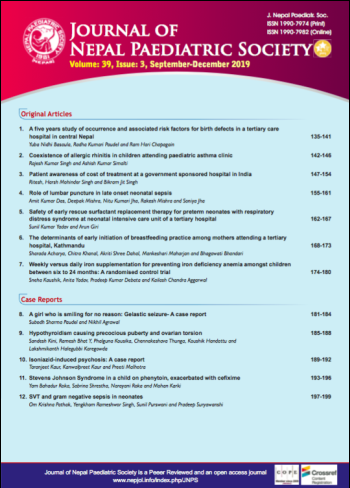Role of Lumbar Puncture in Late Onset Neonatal Sepsis
DOI:
https://doi.org/10.3126/jnps.v39i3.28459Keywords:
CSF examination, late-onset sepsis, lumbar punctureAbstract
Introduction: Neonatal sepsis is a clinical syndrome characterized by signs and symptoms of infection with or without accompanying bacteremia in the first month of life. It is responsible for about 30-50% of the total neonatal deaths in developing countries. Neonatal sepsis can be divided into two sub-types depending upon whether the onset of symptoms within the first 72 hours of life (Early Onset Neonatal Sepsis) or after 72 hours of life (Late Onset Neonatal Sepsis ). Meningitis is an important complication of late onset neonatal sepsis.
Method: This was hospital based prospective observational study conducted among the neonates admitted with diagnosis of late onset neonatal sepsis in Neonatal Intermediate Care Unit (NIMCU) and Neonatal Intensive Care Unit (NICU) of Kanti Children’s Hospital from July 2016 to June 2017. The objective of this study was to evaluate the importance of performing LP in neonates with LONS.
Results: 16.8% neonates with late onset neonatal sepsis were found to have meningitis. Among the neonates with meningitis CRP was positive 57.2% and negative in 42.8 %. Among the cases with abnormal CSF findings, blood culture was sterile in 85% cases and organism was isolated 15% cases. In 88.8% cases with positive blood culture, no meningitis was detected. Lumbar puncture was traumatic in 1 neonate (0.8%) in first attempt. Apart from this no other complication of performing lumbar puncture was noted.
Conclusion: Lumbar puncture and CSF examination is mandatory in all cases with late-onset sepsis.
Downloads
Downloads
Published
How to Cite
Issue
Section
License
Authors who publish with this journal agree to the following terms:
Authors retain copyright and grant the journal right of first publication with the work simultaneously licensed under a Creative Commons Attribution License that allows others to share the work with an acknowledgement of the work's authorship and initial publication in this journal.
Authors are able to enter into separate, additional contractual arrangements for the non-exclusive distribution of the journal's published version of the work (e.g., post it to an institutional repository or publish it in a book), with an acknowledgement of its initial publication in this journal.
Authors are permitted and encouraged to post their work online (e.g., in institutional repositories or on their website) prior to and during the submission process, as it can lead to productive exchanges, as well as earlier and greater citation of published work (See The Effect of Open Access).



